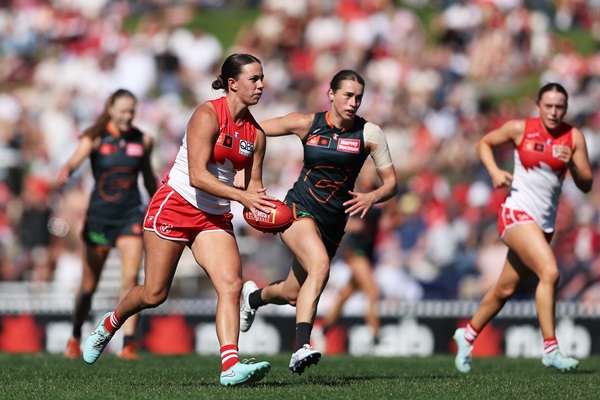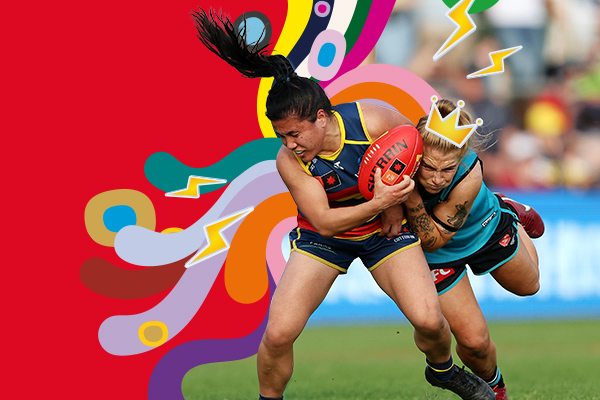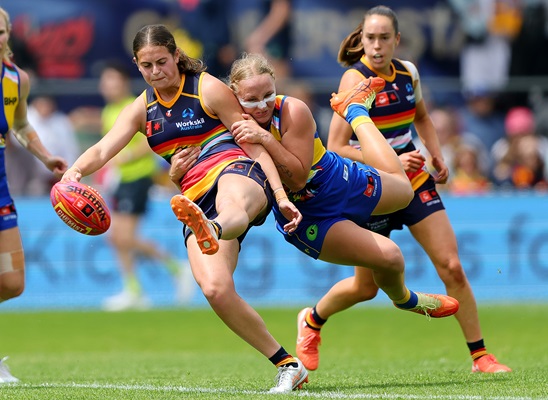-
Medibank is a proud health partner and superfan of the AFLW.
To the spectator, Chloe Molloy seems unshakable. She’s fierce, composed and built on grit and determination. As one of the AFLW’s foundation players, she’s a true trailblazer who has helped shape the league’s identity and opened locker room doors for future generations. But behind the game face is a different side of Molloy. “Off the field, I’m actually a big softy,” she says with a nervous laugh. “I am empathetic and I overthink things.” Like many of us, her biggest battles rarely happen under the stadium lights. “My toughest opponent,” she admits, “is the one inside my own head.”
Watching from the sidelines
Molloy’s identity has long been intertwined with her sport. “Football’s what I channel my energy into,” she explains. “But it’s not just what I do, it’s also who I am.” When an ACL injury sidelined her last year, she was forced to confront who she was without it. “As much as it’s a physical injury,” she says, “mentally it took the biggest toll. My sense of purpose just clouded over. I went from competing every day to sitting still and watching. I lost my rhythm, my independence, my drive. I felt like a burden. And after a while, I just started to withdraw.”
Molloy describes that period as “like watching my own life from the sidelines”. Her partner, her housemate, her close friends – all footballers – were out playing the game she loved, while she sat at home, leg in a brace, barely able to move. “I felt bitter,” she admits. “I was proud of them, but part of me was angry that I couldn’t do what they were doing. I had all this energy and nowhere to put it.”
In the stillness, her thoughts turned against her. “I got really irritable and really closed off. I didn’t want to talk to anyone. I thought, ‘This is my problem, I shouldn’t bring anyone else down with me.’ But that just made things worse. I became my own worst enemy.”
The power of opening up
For Molloy, recovery wasn’t just about rebuilding her knee, it was about rebuilding her relationship with herself. “You can train your body all you want, but if your head’s not right, it doesn’t matter,” she says. “So I started building a toolkit for my mental fitness.”
The first step, was learning to open up. “My psychologist helped me recognise where I was at,” Molloy says. “I had to say out loud, ‘I’m not okay.’ Once I did that, I could start being honest with my friends and my partner too. It’s scary how easy it is to put on a mask. I’d walk into the club like nothing was wrong, when inside, I was falling apart.”
That act of honesty became the foundation of her recovery and her reconnection to others. “I’m a people person,” she says. “I love deep conversations and hearing other people’s perspectives, it helps to normalise how I feel.”
Building her toolkit
Journaling became another way for Molloy to connect, this time with herself. “It helps me quiet that inner opponent,” she says. “It’s not like deep journaling just dot points, one-liners, how I’m feeling. Especially before a game, it clears the clutter so I can play freely.”
Rest also plays a crucial role in her mental fitness toolkit. “Sleep’s huge for me,” she says. “It’s my reset button. I protect it at all costs. It’s like plugging your phone in overnight, if I don’t recharge, I can’t perform.”
But even as her body healed and her confidence returned, Molloy faced another kind of challenge, the noise. Every touch, every move, every comment dissected online. “It’s something I’m still learning to manage,” she admits. “There are days I want to delete social media and just play football. But I remind myself, pressure is a privilege. Not everyone gets it. If people are watching, it means what I’m doing matters.”
Still, the scrutiny can be loud. “You can’t control what others think,” she says. “What I can control is my response. At the end of the day, it’s Chloe versus Chloe. If I’ve done everything I can, when no one’s watching, that’s what gives me confidence.”
Vulnerability as strength
Opening up publicly about her struggles wasn’t easy, but Molloy sees it as a powerful play. “Vulnerability should be seen as a strength,” she says. “When you put yourself out there, you’re opening the door for others to do the same.” The response, she says, confirms it. “I’ve had messages from people saying, ‘I didn’t know you felt that way, it makes me feel less alone.’” For Molloy, that connection and reminder that we’re all human, has become just as meaningful as anything that happens on the field. “At the end of my career, I don’t want to only be remembered for what I did on the field, but how I made people feel,” she says. “If I can help even one person feel seen, that’s worth more than any goal I’ll ever kick.”
Advice for the next generation
For the young players following in her footsteps, Chloe’s advice is simple: know who you are. “Be really strong in your morals and your values,” she says. “You’ll hear a lot of voices telling you what you should be doing. But if you stay grounded in who you are and who’s in your corner, you’ll be okay. Protect your energy. It’ll take you a long way.”
Backing herself
Now, when she runs onto the field, Molloy knows her toughest opponent isn’t wearing another team’s colours. It’s the voice in her head. But these days, she’s learning how to utilise her mental fitness toolkit to help play both sides. “It’s still Chloe versus Chloe,” she says. “I’m my own biggest critic. But I’m learning to be my own biggest supporter too.”
And maybe that’s her biggest victory? It might not show up on the scoreboard, but it’s a game changer.
READ MORE: Bonnie Toogood's mental fitness toolkit
The person behind the player


Medibank. Superfans of the AFLW.
Everybody deserves the chance to reach their full potential. That’s why we’ve joined forces with the AFLW as an Official Health Partner, to help tackle the health barriers facing women in sport.


